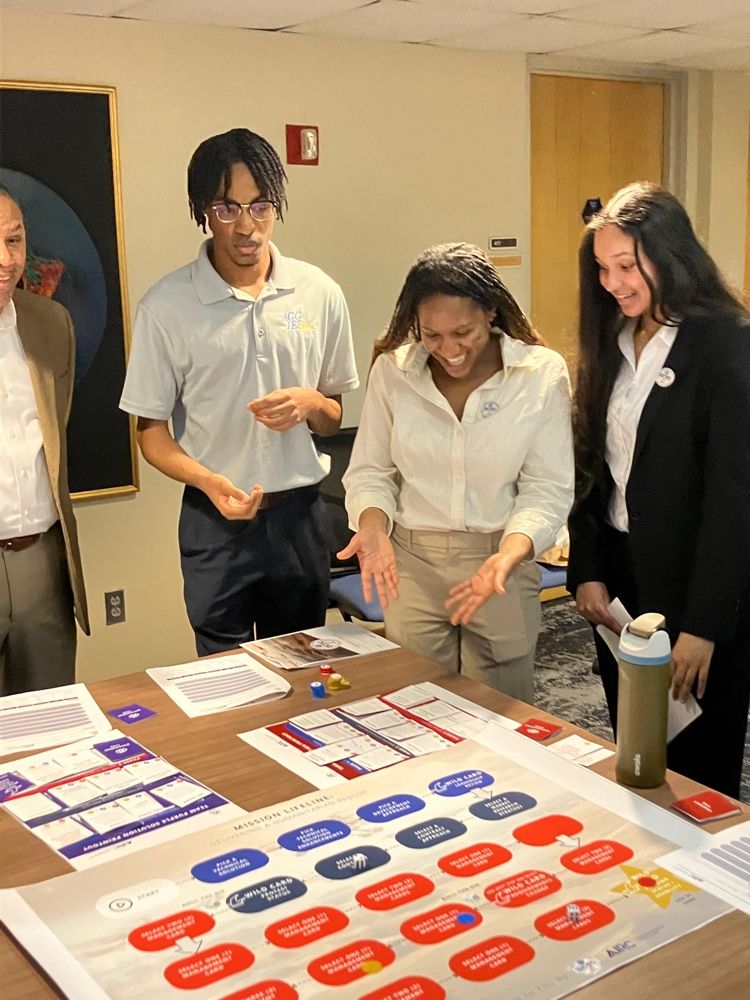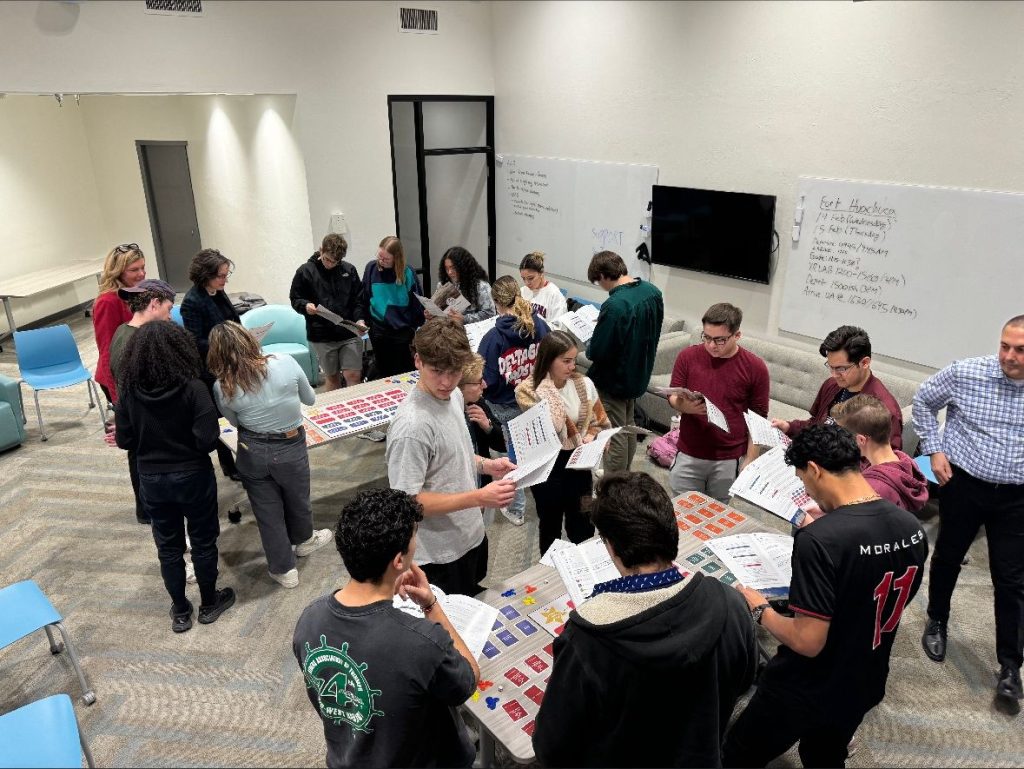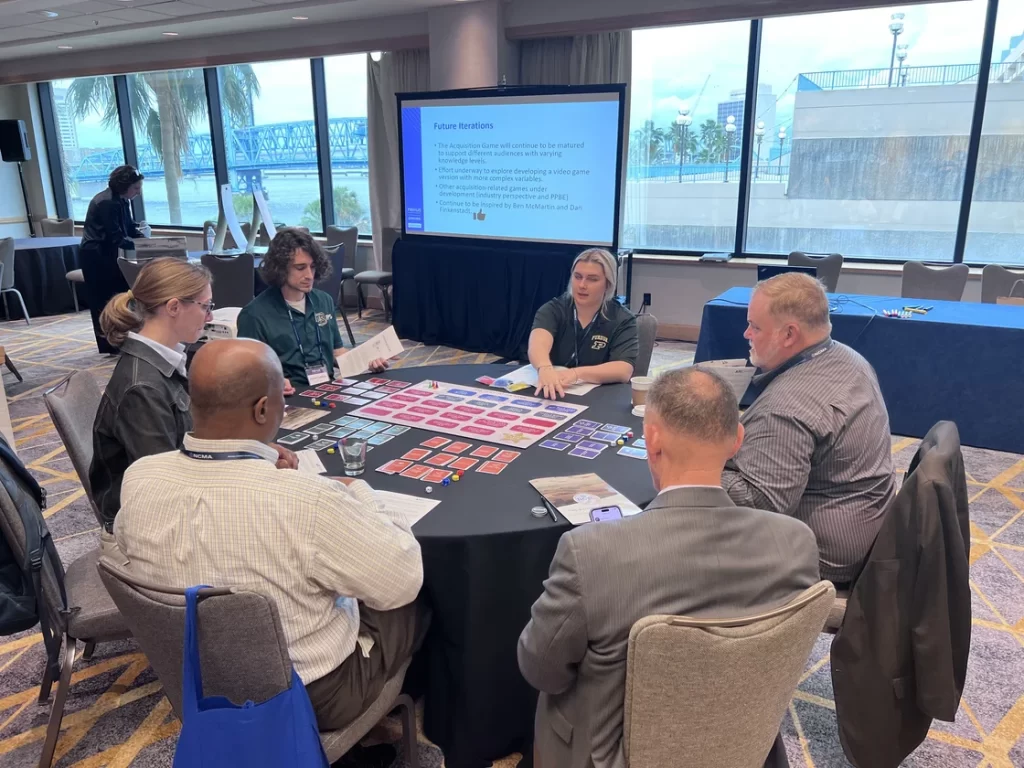JUNE 18, 2024
Gaming the System: DCTC Scholars Master Defense Acquisition Through Play
After a devastating wildfire ravages the Arctic, leaving thousands stranded without food, water, and shelter, you must support the Department of Defense’s (DoD) humanitarian response by utilizing military situational awareness capabilities to coordinate relief efforts.
Such is the premise of The Acquisition Game, a dynamic tabletop game that brings the complex world of DoD acquisition to life—and is an integral component of the Defense Civilian Training Corps (DCTC) curriculum.
DCTC was launched in the summer of 2023 as a congressionally-mandated talent development pilot program guided by the Acquisition Innovation Research Center (AIRC), a multi-university partnership led by Stevens Institute of Technology and sponsored by the DoD through the Systems Engineering Research Center. DCTC offers a diverse curriculum focused on active learning, including summer internships at DoD organizations, a full tuition scholarship, and career preparation for DoD acquisition roles.
DCTC’s inaugural cohort includes 86 scholars representing 49 academic majors from North Carolina State University, Purdue University, the University of Arizona, and Virginia Tech. Karen Thornton, an AIRC Fellow and adjunct professor at the George Washington University Law School, helped implement the program and integrated The Acquisition Game into DCTC’s curriculum.
“The game fosters a deep understanding of the DoD’s acquisition processes and the critical importance of strategic decision-making,” said Thornton. “It introduces scholars to how they’re going to fit in the organization, teaching them their role in the larger enterprise of acquisition, starting with identifying a problem or need.”
Developed specifically for DCTC scholars by AIRC Fellows Tory Cuff and Matt MacGregor and retired AIRC colleague William Rouse, The Acquisition Game challenges players to support communities affected by a simulated crisis while navigating the DoD’s three-phase acquisition process—technical solution, contracting approach, and program management—and balancing user satisfaction, schedule, and cost. The game’s emphasis on stakeholder approval is a crucial learning point and emulates real-world expectations. The game designers solicited and incorporated insights through initial play and feedback from senior leaders in the DoD such as Mr. Mark Krzysko, who serves as the Principal Deputy Director of Enterprise Information for Acquisition Data and Analytics in the Office of the Under Secretary of Defense for Acquisition & Sustainment.
“Making decisions about what kind of technical solution to take, how to contract for it, how to do market research, and how to negotiate always comes back to time, cost, and user satisfaction,” explained Thornton. “The game does a great job drilling this concept into the scholars’ minds.”
While solo play is an option, The Acquisition Game is designed for team play, reflecting the collaborative nature of defense operations and DCTC’s multidisciplinary, integrated learning experience.
“In the DoD and many large organizations, people often work in silos within their specializations,” said Thornton. “Even the smartest engineers can be stymied if they view every issue as an engineering problem when it might actually be a finance problem. We want our scholars to understand that it’s not just the technological solution that will keep us ahead of our near-peer adversaries. It’s also having a team that works collaboratively and communicates well.”
Each team begins the game with 10 schedule chips, 10 funding chips, and eight satisfaction chips. The team with the player whose birthday is closest to July 26—the day the DoD was established—takes the first turn. Teams choose from three technical solutions—UAV swarm, UAV fleet, or satellite—setting the stage for their strategy. As the game progresses, teams encounter wild cards that introduce unforeseen obstacles that push them to adapt quickly and think on their feet. The team with the most user satisfaction chips at the end of the game is the winner.
“Playing a game with real-life scenarios and exposure is much more impactful than just learning from a textbook,” said Thornton. “When the scholars roll the dice and realize there is no textbook answer to the problems we face today in this volatile world, they learn resilience and the ability to stay calm under pressure and work as a team.”
Feedback from scholars has been overwhelmingly positive. Max Davis, a DCTC scholar at the University of Arizona, said, “The board game exercise, paired with collaborative discussions, has equipped me with valuable tools to approach acquisition challenges with foresight, strategy, and confidence.” Faith Jones, a DCTC scholar at Virginia Tech, said, “With the Acquisition Game, learning the acquisition process is not only educational but also enjoyable. Working through the procurement process can be daunting, but with the acquisition game’s realistic scenarios, we were able to use critical thinking, strategic decision-making, and teamwork to create strategies and learn hands-on.”
Looking to the future, DCTC will double down on gamification as a framework for instruction. The curriculum team is adding more complexity to The Acquisition Game for advanced players and arranging a summer internship for three scholars with the Army Gaming Studio, renowned for its innovative work in gamified learning for soldiers on the battlefield. This collaboration will adapt the board game into a video game, introducing new acquisition factors and role-playing features, and expanding its reach to a broader audience. The DCTC curriculum team has also begun designing an Industry Game that simulates company decisions in government partnerships, and there are also plans to build a Planning, Programming, Budgeting, and Execution Game that mirrors the defense resourcing process.
“Learning through play prepares our scholars to be productive members of the DoD acquisition community,” said Thornton. “It’s about grasping the process, honing multidisciplinary problem-solving skills, and cultivating a sense of community and service-oriented mindset to help solve our complex national security problems effectively.”
Read the paper on The Acquisition Game that Tory Cuff and Matt McGregor submitted to the 2024 Naval Postgraduate School Annual Acquisition Research Symposium.
Follow AIRC on LinkedIn for updates on acquisition research and DCTC on LinkedIn and the DCTC Scholars Blog for updates on the pilot program.











